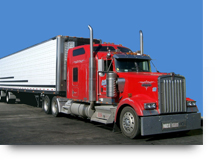 |
||
Rep. Jean Schmidt (R- OH) and Rep. Steve Kagen (D-WI) sent a recent letter encouraging fellow members of the House Committee on Agriculture to support The Safe and Efficient Transportation Act, H.R. 1799. Schmidt and Kagen sent the letter – signed by seven other co-sponsors who serve on the House Committee on Agriculture – to the full Committee. The letter emphasized the agricultural benefits of raising federal weight limits as outlined in the Safe and Efficient Transportation Act. “The Safe and Efficient Transportation Act is a smart, safe way to make our country’s agricultural products more competitive in the global marketplace,” said Rep. Mike Michaud (D-ME), who introduced the bill in the House of Representatives. “Reps. Schmidt and Kagen realize that the current federal weight limit forces many trucks to leave the loading dock half-full – giving countries with higher weight limits the upper hand in agricultural production and shipment. Under the Safe and Efficient Transportation Act, state transportation officials could set weight limits of up to 97,000 pounds for six-axle trucks in order to safely ease the flow of goods, improve highway safety and reduce environmental impact.” “Trucking is a critical link in the agricultural supply chain that stretches from the farm to the consumer,” said John Runyan, executive director of the Coalition for Transportation Productivity. “Trucks often serve as the first, last, or only mode of transportation for agricultural products and other goods produced in the U.S. As Reps. Schmidt and Kagen know, the Safe and Efficient Transportation Act would safely improve the efficiency of truck shipment, making our highways safer, greener and more productive.” The Safe and Efficient Transportation Act of 2009 (H.R. 1799) was originally introduced in the House of Representatives by Reps. Michael Michaud (D-ME) and Jean Schmidt (R-OH). The bill would allow heavier –not larger– trucks on interstates by giving each state the option to increase its interstate vehicle weight limit to 97,000 pounds for trucks equipped with a sixth axle for safety. Without changing truck size, the additional axle maintains current braking capacity and weight-per-tire distribution and minimizes pavement wear. A user fee imposed by the bill would fund vital bridge repair. The full letter can be viewed here. Last July, the Soy Transportation Coalition completed a report titled, “Heavier Semis: A Good Idea?” – a study analyzing the likely results of expanding semi weight limits over the federal highway system. The report verified how increasing semi weight limits offers the potential of enhancing efficiency in transporting agricultural products without endangering fellow motorists or imposing greater damage to the road system. A summary and the full report can be accessed at www.soytransportation.org.
|
||
The Soy Transportation Coalition is comprised of nine state soybean boards, the American Soybean Association, and the United Soybean Board. The National Grain and Feed Association and the National Oilseed Processors Association serve as ex-officio members of the organization. |
||
 |
||
 Rep. Schmidt, Kagen promote greater efficiency for transporting ag products
Rep. Schmidt, Kagen promote greater efficiency for transporting ag products